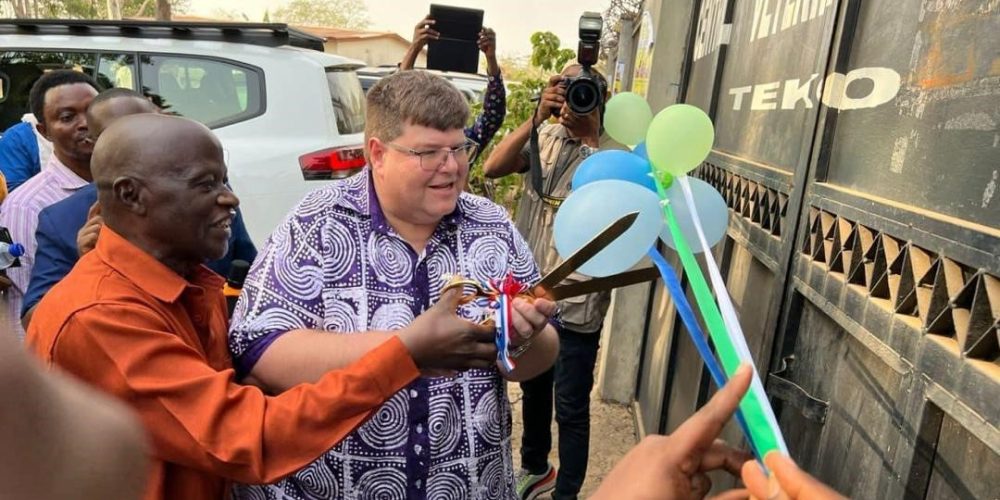The Global Health Security Agenda (GHSA), funded by the United States Agency for International Development (USAID), and implemented by the Food and Agriculture Organization’s Emergency Centre for Transboundary Animal Diseases (FAO ECTAD), has been instrumental in Sierra Leone’s efforts to prevent, detect, and control emerging and endemic diseases. Over the past five years, from October 2018 to September 2023, GHSA has worked tirelessly to strengthen human resources; disease surveillance, laboratory, biosafety and biosecurity as well as antimicrobial resistance (AMR) capacities through a One Health approach.
Recognizing the crucial role of veterinary laboratories in disease surveillance and control, FAO ECTAD has collaborated with the Ministry of Agriculture and Food Security (MAFS) to develop strategies and mechanisms for controlling diseases such as anthrax, brucellosis, peste des petits ruminants (PPR), and rabies.
Renovation of the Central Veterinary Laboratory (CVL)
As part of these efforts, the Central Veterinary Laboratory (CVL) in Makeni, Bombali district, has undergone significant renovation and upgrading. With support from USAID funding, the CVL has been refurbished and equipped to meet Biosafety Level 2 (BSL-2) standards. This upgrade has enabled the laboratory to conduct testing and confirm suspected cases of animal diseases with enhanced safety and accuracy.
In recognition of this achievement, as a result of the FAO and USAID collaboration, the United States Ambassador to Sierra Leone and the USAID team visited the CVL in Makeni from 12 to 14 March 2024. During this visit, FAO ECTAD led a symbolic handing over ceremony of the CVL and its equipment. This event not only commemorated the transformation of the laboratory but also reaffirmed the ongoing commitment to improving animal health and disease surveillance in Sierra Leone.
The United States Ambassador to Sierra Leone, Bryan David Hunt, expressed happiness in participating in the symbolic handing over ceremony of the CVL and acknowledged this important accomplishment. He noted “The increasing number of opportunities for zoonotic diseases to transfer from animals to humans, illustrated by past examples like Ebola, Zika, and COVID-19, underscores the urgent need for robust animal disease control programs”. He also affirmed that “The United States Government is committed to enhancing Sierra Leone’s animal disease control programs, ensuring the nation’s overall health security and readiness to prevent, detect, and respond to infectious disease outbreaks.”
Deputy Minister II at the Ministry of Agriculture and Food Security, Sahr Hemore, expressed gratitude that USAID and FAO became partners in such a critical venture. He highlighted the CVL’s role as a reference point for animal health in the region, emphasizing the interconnectedness between animal and human health. He urged all stakeholders present to not only claim ownership but also protect the facility as a national asset. He referred to the Central Veterinary Laboratory as a “national asset that must be protected at all costs”.
Revitalizing Sierra Leone’s Veterinary Service
The Sierra Leone Central Veterinary Laboratory in Makeni was inaugurated on 14 December 2017. FAO, in partnership with the Ministry of Agriculture, Forestry, and Food Security (MAFFS), rehabilitated the laboratory to enhance its capacity as the country’s main referral center for animal health services. This initiative, inaugurated by President Dr. Ernest Bai Koroma, marked a significant step towards improving food and nutrition security and creating employment opportunities. The laboratory’s renovation enabled veterinary scientists to investigate diseases affecting both animals and humans, with USAID pledging continued support for equipment provision and technician training. With FAO’s training of field officers and ongoing focus on strengthening surveillance capacity, the CVL was poised to address disease outbreaks effectively. Through major renovations and equipment provision, FAO, with USAID funding, revitalized the laboratory, ensuring it fulfilled its role as a leading animal health center in West Africa.
The partnership between FAO ECTAD and USAID highlights the significance of international cooperation in bolstering veterinary capabilities and improving disease monitoring. The upgraded CVL in Makeni serves as evidence of the dedication to advancing global health security objectives and protecting public health in Sierra Leone.
Copy right –Printed in the Expo Times News on Monday, march 18th, 2023 (ExpoTimes News – Expo Media Group (expomediasl.com)





